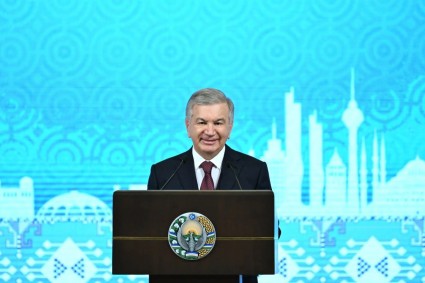A joint action plan (Road Map) for the Mazar-i-Sharif-Kabul-Peshawar railway project was adopted on February 2 in Tashkent following the Uzbek-Afghani-Pakistani talks, the Ministry of Investment and Foreign Trade said in a statement.
The construction timelines for a railway with an estimated length of 600 km with a 1520 mm gauge may reach up to 5 years. At the same time, the construction of a high-voltage power line Surkhan - Puli-Khumri and the CASA-1000 energy project, which provide for the creation of conditions for the supply of seasonal surplus hydroelectricity from Central Asia to cover the growing demand for electricity in Afghanistan and Pakistan, will allow to reduce the cost of building overlapping sections roads, the statement added.
In the future, the prospects for electrifying the road are reportedly not ruled out, which "will significantly increase the economic efficiency of the transportation of goods."
According to the Road Map, a joint international expedition will be organized in March - April this year to study the route of the railway and prepare materials for design. The expedition will conduct a complex of geodetic, geological, hydrogeological and topographic research in Afghanistan. This will allow collecting and analyzing information on potential cargo-forming and cargo-absorbing regions, as well as large deposits of minerals in Afghanistan, located within walking distance from the route of the future road. Based on the materials of the field expedition, the key issues of the development of a feasibility study (FS) of the project will be agreed.
According to the Ministry, engaging the international consulting companies, it is also planned to study the traffic of transportation of export-import cargo along the South Asia - Afghanistan - Central Asia - Russian Federation - Eastern Europe route.
The study covers foreign trade and freight turnover of the countries of Central Asia, the South Caucasus with the countries of South Asia. Large investment projects implemented in Central Asian countries with the participation of Pakistan and India, as well as the countries of Southeast Asia will be studied.
As noted in the ministry, in 2025, the volume of trade of India and Pakistan with Afghanistan and the CIS countries may reach US$ 20 billion and US$ 6 billion, respectively. Currently, cargo between the countries of South Asia and Southeast Asia and the CIS countries is transported mainly by sea. The Asian Development Bank, which implements the international program of Central Asia Regional Economic Cooperation (CAREC), can act as the coordinator of the pre-project study.
During the trilateral negotiations, the leaders of the World Bank, Asian Development Bank, European Bank for Reconstruction and Development, European Investment Bank, Islamic Development Bank, Asian Infrastructure Investment Bank, International Development Finance Corporation (USA) reiterated their interest in joint implementation of this project.
The World Bank, with the participation of the involved ministries and departments of Afghanistan, Pakistan and Uzbekistan, proposed to develop a model for financing the construction of a railway, to determine mechanisms for drawing and using funds. The forum participants approved the WB's proposal to take on a coordinating role in promoting the project, the message says.
The Roadmap provides for a detailed study with international financial institutions and the governments of donor countries of the railway management model, including the issues of ownership, supply and maintenance of freight and rolling stock, maintenance of railway tracks and infrastructure facilities, formation of tariff and transit policy, as well as the mechanism return on investment.
To implement the project, a joint working group was set up, headed by the heads of the railway authorities of the countries participating in the project. Coordination will be led by permanent offices established in the three countries and designated responsible officials.
Thus, according to expert estimates, the full implementation of the transport and infrastructure potential of Afghanistan will reduce the time for transporting goods, for example, from Uzbekistan to Pakistan, from 30-35 to 10-15 days, the Ministry noted. Transportation of goods on the new railroad can reduce transport costs between Russia and Pakistan by 15-20%, and between the countries of Central Asia with Pakistan - by 30-35%.
An increase in the transit of goods between the countries of Southeast Asia and Eastern Europe is also predicted on the railways of Russia, Kazakhstan and Uzbekistan. Thus, according to the participants of the meeting, the annual growth rate of the volume of freight traffic on the railways of the Russian Federation, Kazakhstan, Uzbekistan and Afghanistan in recent years topped 25%. In 2020, 4 million tons of cargo were transported along this road, which indicates the high dynamics of the recovery of the Afghan economy. According to preliminary data, already in the first years since the start of operation of the Mazar-i-Sharif - Kabul - Peshawar railway, the volume of cargo transportation along this route may reach 10 million tons.
“The route being created is designed to connect the world's longest international railways, which will form a new paradigm of international trade and economic cooperation on a continental scale and will become a solid platform for sustainable development and improving the living standards of the population of many countries,” the statement said.
According to Turkish Anadolu, last month the three countries signed a joint request for a US$ 4.8 billion loan from international financial institutions for the Trans-Afghan Railway project.
On November 12, 2020, President Shavkat Mirziyoyev signed a decree approving measures for the implementation of all aspects of the Mazar-i-Sharif-Kabul-Peshevar railway project, which would provide access to the ports of Pakistan. According to the document, the construction of the road is planned to start in September 2021.
The governments of Uzbekistan and Afghanistan in December 2017, during the visit of Afghan President Ashraf Ghani to Tashkent, signed an agreement on the Mazar-i-Sharif - Shibergan - Maimana - Herat railway project.















